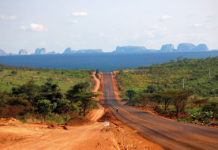The 2030 Agenda for Sustainable Development, adopted by all United Nations Member States in 2015, provides a shared blueprint for peace and prosperity for people and the planet, now and into the future. At its heart are the 17 Sustainable Development Goals (SDGs). They are broad and ambitious, calling on all countries – be they upper, middle or low income – to make tangible Sustainable Development Goals improvements to the lives of their citizens. The goals encompass social, environmental and economic aspects. They recognize that ending poverty and other deprivations must go hand-in-hand with strategies that improve health and education, reduce inequality, and spur economic growth – all while tackling climate change and working to preserve our oceans and forests.
The Organisation for Economic Co-operation and Development (OECD) supports the United Nations in ensuring the success of the 2030 Agenda for Sustainable Development by bringing together its existing knowledge, and its unique tools and experience, including:
c A strong track record in policy work with developed and developing countries
c Measures and systems for monitoring performance
In addition, OECD partnerships are creating synergies among private and public, domestic and international, and donor and developing country resources to provide countries with a strong support mechanism on which to build towards a better future.
SDG 01 – No Poverty: End poverty in all its form everywhere.
SDG 02 – Zero Hunger: End hunger, achieve food security and improved nutrition and promote sustainable agriculture.
SDG 03 – Good Health and Well-being: Ensure healthy lives and promote well-being for all at all ages.
SDG 04 – Quality Education: Ensure inclusive and equitable quality education and promote lifelong learning opportunities for all.
SDG 05 – Gender Equality: Achieve gender equality and empower all women and girls.
SDG 06 – Clean Water and Sanitation: Ensure availability and sustainable management of water and sanitation for all.
SDG 07 – Affordable and Clean Energy: Ensure access to affordable, reliable, sustainable and modern energy for all.
SDG 08 – Decent Work and Economic Growth: Promote sustained, inclusive and sustainable economic growth, full and productive employment and decent work for all.
SDG 09 – Industry, Innovation and Infrastructure: Built resilient infrastructure, promote inclusive and sustainable industrialization and foster innovation.
SDG 10 – Reduced Inequality: Reduce inequality within and among countries.
SDG 11 – Sustainable Cities and Communities: Make cities and human settlements inclusive, safe, resilient and sustainable.
SDG 12 – Responsible Consumption and Production: Ensure sustainable consumption and production patterns.
SDG 13 – Climate Action: Take urgent action to combat climate change and its impacts.
SDG 14 – Life Below Water: Conserve and sustainably use the oceans, seas and marine resources for sustainable development.
SDG 15 – Life on Land: Protect, restore and promote sustainable use of terrestrial ecosystems, sustainably manage forests, combat desertification, and halt and reserve land degradation and halt biodiversity loss.
SDG 16 – Peace and Justice Strong Institutions: Promote peaceful and inclusive societies for sustainable development, provide access to justice for all and build effective, accountable and inclusive institutions at all levels.
SDG 17 – Partnerships to achieve the Goal: Strengthen the means of implementation and revitalize the global partnership for sustainable development.
The proposed Sustainable Development Goals (SDGs) field may contain not only one, but also multiple objectives/targets, and each objective/target can be found in multiple SDGs.
Improving policy coherence
The multi-dimensional nature of the SDGs requires linkages across policy areas.
The OECD addresses the multidimensional nature of diverse issues through a variety of horizontal projects and international initiatives. Its Policy Coherence for Sustainable Development Framework helps to identify synergies and trade-offs among economic, social and environmental policy areas.
The SDGs provide a solid foundation for supporting resilient societies, dealing with humanitarian emergencies, and reducing risks of instability and shocks – even in the most difficult places.
The OECD is helping countries to review their policies and approaches to working in challenging contexts to ensure they are fit for purpose.
Promoting investment in sustainable development
The ambitious scope of the SDGs will require financing on an unprecedented scale.
New resources must be tapped and commitments must be measured and monitored. Private investment is essential to deliver long-term sustainable development.
The OECD Policy Framework for Investment is a comprehensive and systematic approach to improving investment conditions, an ideal tool for unlocking private resources.
The OECD also works with developing countries on many fronts to support them in mobilizing domestic resources.
Official development assistance (ODA), which is tracked and monitored by the OECD, will remain at the core of many developing countries’ financing portfolios – especially the neediest countries. In addition, the new OECD – developed framework for total official support for sustainable development (TOSSD) captures a wide range of resources in support of sustainable development that complement ODA.
Supporting inclusive growth and well-being
The SDGs promise to leave no one behind, putting sustainable development in motion everywhere, for the benefit of all.
The OECD Framework for Measuring Well-Being and Progress goes beyond GDP growth and is increasingly being used by developing countries to identify and assess development challenges. Other OECD projects such as the Inclusive Growth initiative, the Multi-Dimensional Country Reviews, regional policy assessment programmes, and youth inclusion and social protection projects in developing countries also incorporate well-being.
The OECD works in particular to deliver the SDGs for women and girls through a range of partnerships and programmes. It also provides solid and comprehensive policies for the integration of migrants and their children.
Ensuring the planet’s sustainability
Successful implementation of the SDGs will require striking balance between socio-economic progress, sustaining the planet’s resources and ecosystems, and combatting climate change.
OECD works with its members, partner countries and other stakeholders to ensure sound environmental management that supports the sustained achievement of economic development and prosperity, while delivering human security and resilience. For example, together with the World Water Council, the OECD has created a High Level Panel on Financing Infrastructure for a Water Secure World.
The OECD tracks international climate finance and is sharing its expertise on these flows, and on the implications of different methodologies for estimating climate finance.
Promoting partnerships
To implement the SDG goals and targets, governments all over the world, international and non-governmental organisations, the private sector and civil society will need to team up. Working together they can unlock the necessary financial resources, share technologies and create national capacities.
The OECD provides a platform for a dialogue and exchange. Together with United Nations Development Programme (UNDP) it supports the Global Partnership for Effective Development Co-operation, which brings all stakeholders to the table to discuss development issues on an equal footing.
Strengthening data availability and capacity
Turning the ambition of the SDGs into reality will require robust data to capture progress and evidence to inform decision making.
The OECD is helping countries to track progress in areas such as trust, health inequalities, green growth, income and consumption inequality, and job quality. It supports countries in developing and using environmental and green growth indicators and in achieving environment-economy integration over time.
The OECD also supports developing countries in building their own statistical capacities and systems through the PARIS21 partnership.
Facilitating follow up and review
Inclusive follow up and review will be essential to incentivize action and learning around the 2030 Agenda.
OECD country assessments, peer reviews and peer learning mechanisms across a range of policy – economic, investment, environmental, energy, migration, education, development co-operation and more – play a key role in sharing learning and knowledge, improving policies and practices, and building trust and mutual respect among partners.
The OECD is adapting its range of assessment and learning mechanisms – including the Programme for International Student Assessment, or PISA – to the new 2030 Agenda.
Further info on this topic can be found on OECD and UN website.

![[:en]Capture d’écran 2020-10-12 à 15.59.46[:]](https://perspectives-cblacp.eu/wp-content/uploads/2020/10/Capture-d’écran-2020-10-12-à-15.59.46.png)


